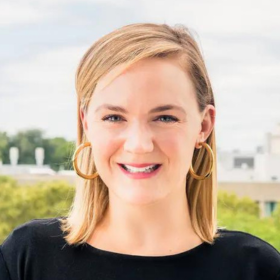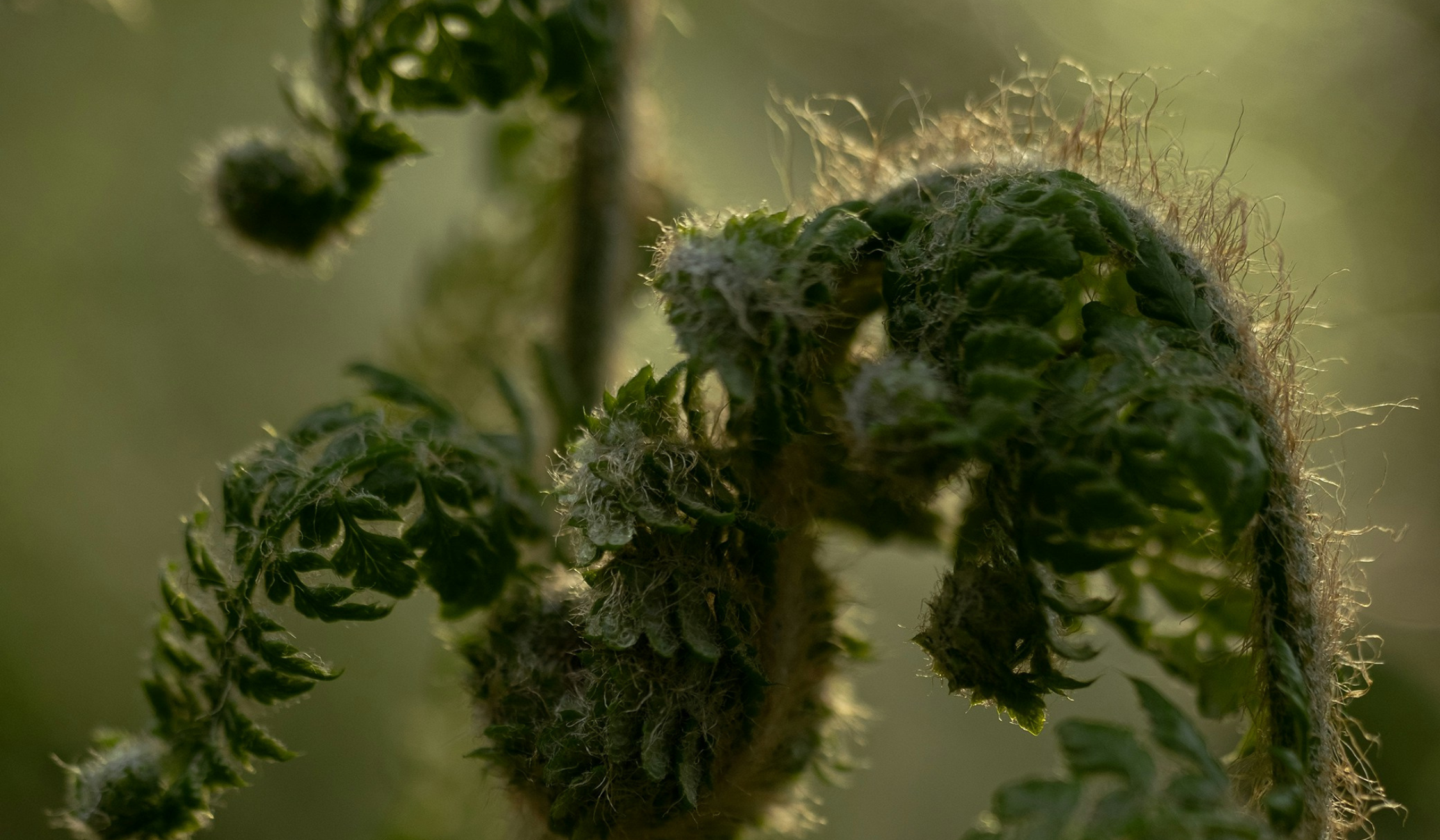A Vision of Plant Souls: How Rachael Petersen is ‘Re-Weirding the Western Canon’
Bioneers | Published: August 21, 2024 Nature, Culture and Spirit Article

The desire that compelled Rachael Petersen to pivot from environmental policy to studying the intricate lives of plants sounds simple on its face: to know plants on their own terms. What it prompted was not just a career shift, but a change in mindset that led Petersen to pursue a master’s of divinity at Harvard University, where she would bring attention to another scientist who — 175 years earlier — underwent a similar transformation.
Petersen now leads the Thinking with Plants and Fungi Initiative at the Center for the Study of World Religions at Harvard, an 18-month initiative that seeks to enhance interdisciplinary cooperation between biology, ecology and the humanities in plant cognition. It is, in many respects, a far cry from the environmental policy work she pursued for a decade.
She said that since her adolescence, she’d been dedicated to protecting and alleviating the suffering of other beings, including non-human beings. As an undergraduate, she earned bachelor’s degrees from Rice University in environmental policy and anthropology, with a minor in poverty, justice and human capabilities. As an environmentalist, she conducted fieldwork in the Amazon, Borneo and Arctic Canada. When she ultimately got a position working in Washington, D.C., at Global Forest Watch at the World Resources Institute, she felt extremely fortunate.

“I wanted to dedicate myself to protecting forests,” Petersen said. “So I was really fortunate to land this job working with this new initiative, where we were monitoring deforestation in real time from space using satellite imagery, so taking pictures of trees and then using A.I. to detect where they were being cut down.”
As deputy director of Global Forest Watch, she worked with governments, companies and Indigenous communities to use these new technologies to reduce deforestation. She described it as the highlight of her career; however, as she sought to protect forests using the wealth of sophisticated data at her fingertips, her grief was mounting.
“I experienced a lot of despair and, increasingly, depression,” Petersen said. “At parties, I would joke that my job was to watch the world die in real-time from space. I realized that I was spending all this time fighting and grieving for these landscapes without really getting to know them on their own terms.”
A 19th-Century Perspective “On the Soul-Life of Plants”
This realization is how Petersen’s path would converge with the relatively unknown 19th-century German physicist-turned-plant-scientist Gustav Fechner, who championed the idea that plants have souls. In 2021, Petersen left her work in environmental policy behind and entered the master’s program at Harvard’s Divinity School, where for her thesis she translated Fechner’s 1848 book “Nanna: Or on the Soul-Life of Plants” (Nanna being the Norse goddess of flowers) and provided an introduction to his thought. Fechner later expanded on these ideas, positing that this awareness extended to the natural world and the universe more broadly.
Fechner’s life is remarkable not just for his work, but the turn of events that inspired his own change in trajectory. As Petersen recently chronicled in Aeon, Fechner diverged from physics following a period of temporary blindness and an episode of what we might today characterize as depression, neurotic obsession and mania. After damaging his vision when conducting experiments into after-images by staring at the sun through tinted glasses, he retreated to a dark room and emerged only with his eyes covered, first with a cloth blindfold and then custom-crafted goggles. He slowly healed, his transformation occurring when, after three years of living in darkness, he stepped outside for the first time without his eye coverings. It was then that he caught what he described as “a beautiful glimpse beyond the boundary of human experience.”

“Every flower shone towards me with a peculiar clarity, as if it were throwing its inner light outwards,” he would later write. “One must only open one’s eyes afresh to see nature, once stale, alive again.”
In Aeon, Petersen writes that this transfiguration would inspire Fechner to give his first lecture in six years and to write “Nanna,” where he argues that plants are conscious beings with feelings and desires. In the book, Fechner often uses the word for soul and mind interchangeably as belonging to a being that experiences feelings, including internal urges and external stimuli; intuition and emotion. Cast in modern terms, Petersen writes, we might simply say a soul is the capacity for subjective experience, or what some cognitive scientists call primary or phenomenal consciousness. She writes that Fechner anticipated many claims of the contemporary plant neurobiology movement and would spend his whole life “trying to heal the divide between mind and matter, and the commensurate split between philosophy and science.”
Though Fechner’s breakdown was more dramatic than hers, Petersen nevertheless recognizes the parallels between their academic transitions. Even when Fechner was engaged in physics, she said he was “a secret Romantic,” reading philosophy from the German Romantics such as Schelling, Schiller and Goethe. Petersen said when working in D.C., she also had a deeply poetic, romantic and spiritual streak that she had trouble finding a place for at the office. Fechner’s experience, including his breakdown and reinvigoration, resonates with her.
“He was a scientist, and he basically also went through a period of burnout,” she said. “He went blind, in this case, for three years, and then one day he took off his blindfold, he saw the souls of plants, and he healed. So I was very drawn in by that experience, kind of as an analogy and a parallel to my own life.”
Fechner would go on to write the three-volume work “Zend-Avesta,” where he extends his thinking to celestial bodies. In many ways, Petersen argues, Fechner was a pantheist or a panpsychist, subscribing to the ancient theory that all things have a mind or mind-like quality — but plants were the entry point for him.
The context of Fechner’s work also resonated with Petersen. She points out that he was living at a time when scientists increasingly wanted to explain everything in mathematical and physical terms. She said he was “holding down the fort of soul,” which was becoming increasingly unpopular to talk about. Now, 175 years later, what Petersen wants to talk about can feel similarly unpopular, as plant scientists who endorse the possibility of plant sentience can face significant criticism from the broader academic community.
Re-weirding the Western Canon
The Thinking with Plants and Fungi Initiative delves into plant cognition and other fundamental questions. As part of its exploration into how plants and fungi help us rethink the nature of mind and matter, the Initiative engages questions arising from academic scholarship and traditional wisdom, including: what is “intelligence,” where does it extend, and how? What is matter, and what does it mean to label it “animate” or “inanimate”? How can we broaden practices of “care” to include other forms of life? How does the study of plants enrich or complicate our understanding of humans’ place relative to other beings?

Petersen thinks an interdisciplinary approach that relies on more than just empirical science is needed to accomplish what set her on this course to begin with — to understand plants on their own terms. She said because plants are so different from humans and non-human animals in their structure, function, and life, they demand that we “marry the empirical with the imaginal.” That means bringing in tools such as philosophy; anthropological or historical perspective; and learning from the countless Indigenous, animist, and pagan traditions that have long regarded plants as sentient or as persons with whom we must cultivate reciprocity.
“Plant neurobiologists say that plants have all five senses that humans do and 15 more,” she said. “Fifteen more senses that are not ones that humans have might require methods that are a bit more imaginative than empirical observation. We need all the tools in our disciplinary toolkit, I think, to imagine them fully.”
In a way, Petersen sees her role as reckoning with the fact that Western culture has long attempted to edge out more holistic understandings of reality. She said Fechner’s work represents an element of the so-called Western canon that was dismissed at the time of its publication. She wants to bring attention to Fechner and other similarly forgotten thinkers who challenge the anthropocentric views that have dominated Western thought going back to Aristotle, who, in “De Anima,” deemed plants the lowest form of life, construing them as defective animals. She said she wants those who grew up under the confining shadow of Aristotelian ideas to know that the framework of plant personhood was something that many cultures have recognized and more common to humanity than some may realize.

“People are looking for philosophical frameworks to hold their relationships with plants, and oftentimes, I think there’s a risk of appropriating other cultures that do have the framework,” Petersen said. “But those of us living with our Aristotelian hangover don’t. I want to see more research in the humanities in what might be called re-weirding the Western canon, so finding those forgotten ancestors, such as Fechner, who did actually believe in plant personhood.”
By enhancing interdisciplinary cooperation between biology, ecology, and the humanities, the Initiative seeks to nurture current and future leaders in plant studies and “demonstrate how nature’s intelligence can inspire new models of cooperation, flourishing, and coexistence.” Personally, Petersen said she sees her work as revitalizing the vision of Goethe and other German Romantics who saw science as incomplete without elements such as poetry and philosophy. As she describes it, the Initiative is, above all, an invitation.
“It’s not that I’m trying to dethrone science at all; research is a vital part of the puzzle,” Petersen said. “But I’m inviting us into a more holistic understanding of reality through additional modes of understanding and other modes of experience that do not lend themselves to empirical observation.”
The 18-month Initiative will culminate with a conference May 15-17 at Harvard, which will bring together scholars from different fields around the world. Petersen said there will be guest speakers, blog posts, and academic articles leading up to the conference.

